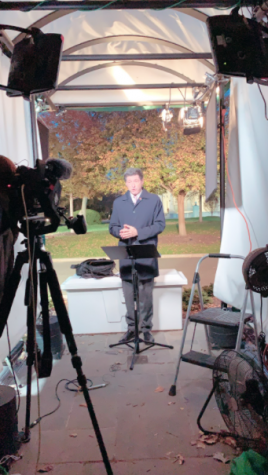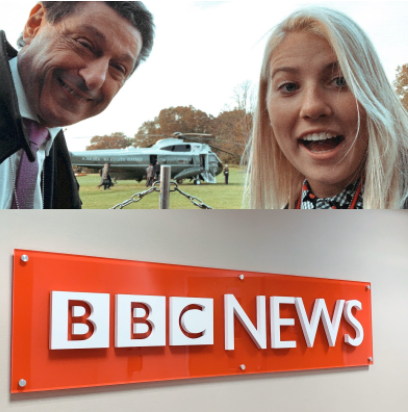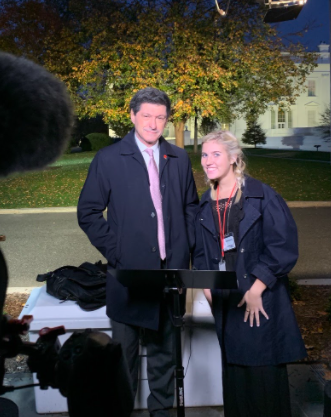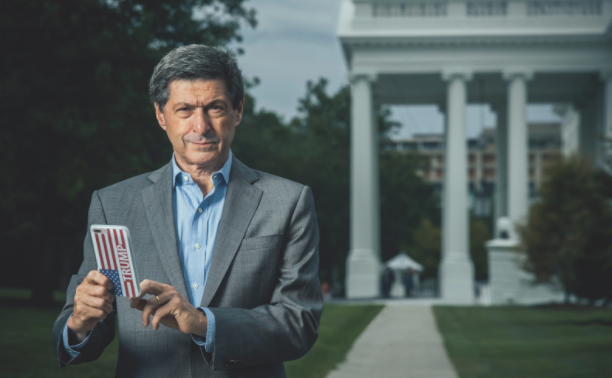Advice for a Young Journalist: A Discussion with Mr. Jon Sopel
Donald Trump, politics, and journalism: BBC veteran newsman gives the inside scoop.
December 15, 2020
I had the great pleasure of interviewing Mr. Jon Sopel of the BBC, someone whom I now consider a friend and mentor. I had the opportunity to intern under Mr. Sopel at the BBC’s Washington Bureau in the Fall of 2019 during President Trump’s impeachment trial. I was curious to see how the world of journalism operated, especially in such a news heavy part of the country. After a week with Sopel and his colleagues, I gained more knowledge than I thought possible. I will always look back at that experience as the highlight of my sophomore year. The internship included trips to the White House, a look at live broadcasting in and out of the studio, standing just feet from the President of The United States and an up-close look into each department at the BBC’s office on M Street.
Sopel is the British television correspondent for the BBC and the North American Editor. He gets to experience politics first hand in the US and broadcasts it back to the people of Great Britain every evening. He primarily broadcasts from the front of the White House.
I decided to reach out to Sopel to see if he would be willing to take time from his busy schedule to answer a few of my questions. Thankfully, he replied with an enthusiastic yes and we found a time to talk before Thanksgiving.

I kicked off the phone call with a question that had been on my mind all semester in Journalism: When interviewing people, how does an interviewer manage to remember everything the interviewee says? Is it better to record the conversation or to take notes?
Sopel explained that he learned how to write shorthand early on in his career. Shorthand is the writing style that secretaries typically use. It consists of short and concise sentences. Recording, however, is also very helpful when trying to back up your story. You want to avoid fake news and have proof if your story is questioned.
“People think that being a good communicator is all about how you speak or perform. But the key part is not only that you can transmit, but that you can receive” said Jon Sopel.
Sopel is originally from London, England. He has been in the States for almost seven years and plans to wrap up his time here in the next year. I asked him to explain the main differences between journalism in the UK and here in the US. He explained that the content is the same, both countries are eager to know the news.
One of the differences, he noted, is the fact that the television news shows in the UK are not as biased or affiliated with a political party as they are in the US. It seems that in the UK, political opinions are reserved for the newspaper.
Journalists in the US take themselves and their opinions very seriously. Sopel said that there is “an earnestness in American journalism where they seem to think of themselves as politicians.”
Both politicians and journalists have the desire to reach out and inform their audience. Yet, journalists goal with regard to their audience should be to keep them “informed enough to make a judgment based on fact.”
Over the years Sopel has had unbelievable exposure to people in politics from both countries. I was interested to know in which country, the US or the UK, were political figures easier to contact and interview.
He stated that in the UK political figures are much easier to get time with than in the US; one of many reasons is that he is with a British broadcasting news station. British politicians are very familiar with the BBC and are more likely to want to make an appearance which will appeal to their main audience.

While the BBC may be the most successful non-American news channel, Sopel said politicians such as Trump and Biden most likely never agree to make an appearance on the network.
“They would feel more inclined to spend their time appealing to their electors instead of international viewers,” said Sopel.
With regard to interviewing politicians, I was curious to know whether there was a personality difference between the two countries’ public figures. For instance, were politicians more forthcoming in the UK than they are in the US?
He admitted that politicians will judge in the UK whether the interview is in their best interest or not. Others may be reluctant to be interviewed. Often they will agree if they feel it is a good time to put spin on a policy or clarify their views.
Sopel explained that not being an advertiser does not mean you have to be more critical. It just allows for the authority to not be as agreeing, and the faculty to practice more distance.

As we began discussing the news I asked him to compare viewer consumption and talk about the differences in audience in each country. He noted that there has been a big change in the last five years with the help of the media.
It has become more divided in both television news and with journalism as a whole. People are not all willing to hear any opinions that differ from their own. Sopel said, “people have stopped believing there is something of an objective truth.”
When asked about what may have caused this shift, Sopel said the media was to blame. Sources such as Facebook and Twitter have allowed anyone to work as a journalist, and report and post whatever they would like.
News stories used to solely be accessible through television news and the newspaper, but due to social media people have the ability to share their own versions of stories and their own version of the truth. Some have become less tolerant of others’ viewpoints and now have the platform to express themselves at any time.
Sopel proposed that the news became a different business model in 2016 with the election of President Donald J. Trump. News channels had to choose which side of the political parties to be on, causing more divide. Sopel noted that news at times has become a sort of propaganda.
My final point of inquiry for Mr. Sopel was if he had any advice for high school journalists. He suggested that the most important thing is to keep writing. Write, and question. “Look at what is good and what you think makes it good,” said Sopel.
He claimed that our job as journalists is to be “skeptical and we don’t have to believe everything we are told.”
The biggest mistake, according to Sopel, is to think that you’re competing against someone. There should be no opponents in journalism work. “We are to hold people to account for what was said and to then tell others what is going on,” said Sopel. You need to ensure that you have a trustworthy source of information. A journalist’s job is to be trusted and to report the news. And above all, continue to question and write.







